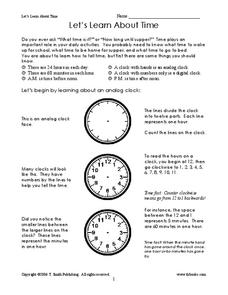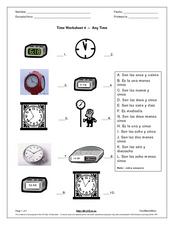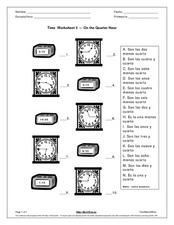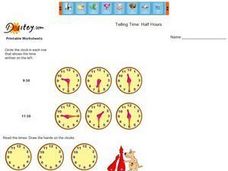Curated OER
Telling Time: Free Version
In this telling time worksheet, students solve 9 problems in which the time on an analog clock is analyzed. Students write the time in numbers under each clock. All times are to the nearest 5 minutes.
Curated OER
Telling Time to the Half Hour
First and second graders use the half hour increments displayed by the clock hands to determine the time to the half hour. Telling time to the half-hour can be tricky. This worksheet provides valuable practice.
Curated OER
Let's Learn About Time
Learning to read an analog clock is not a lost art! Use these worksheets as you introduce youngsters to telling time. Because much of this packet is informational and includes a lot of text, this may be intended for older students....
Common Core Sheets
Reading an Analog Clock (1 Minute Increments)
Third graders read analog clocks and tell time to the nearest minute. AM and PM do not matter in this exercise.
Common Core Sheets
Matching Clocks (Half Hour Increments)
First graders read an analog clock and then match it to the corresponding digital clock. Each clock tells time to the nearest 30 minutes.
Curated OER
¿Qué hora es? What time is it?
This is a great reference guide for your middle and high schoolers learning how to tell time in Spanish. There are no practice opportunities provided, so consider pairing this with an exercise to get your learners using the information.
Curated OER
Extra Practice with Time: Using menos
How do you tell time in Spanish? Provide each learner with this reference guide and practice sheet to introduce telling time in another language. Begin by reading through the first two informational pages that describe how time is...
Curated OER
What Time Is It? Part 2
Tell time to the half hour with these analog clocks! The first six problems invite first graders to write the correct times below, while the second set of problems provide the time and empty clock faces. A great way to review your time...
Curated OER
Match the Times
Get youngsters comfortable with telling time on both analog and digital clocks. They match times to the clock faces, all of which read a time on the hour or half-hour. The times are written out here (i.e. "half past nine" or "9...
Curated OER
Digital Clocks
Don't skip over digital clocks when teaching youngsters how to tell time; here are 10 opportunities for them to practice with half-hour increments. For the first five, they write the time below each clock. The format is word form (half...
Curated OER
Clocks and Watches
Telling time is an important skill. Beginners to this concept determine the time to the nearest half hour using both digital and analog clocks. There are two examples here demonstrating the form scholars should use when recording each...
Curated OER
Using Clocks: Analogue Clocks
What time is it? Have the class practice telling time to the half hour by reading and labeling each of eight clocks. On a second set of eight clocks, they use the time shown to draw in the missing clock hands. An answer sheet is included.
Curated OER
Time Worksheet- Any Time
Assess your scholars on their ability to tell time in Spanish. They'll match both digital and analog clocks with the correct, written-out time. Consider adding some of your own analog and digital clocks and having learners write the...
Curated OER
Telling Time for Grade 3
Ten questions are provided to review elapsed time. Your third graders will like that some questions provide visual representations to guide learners. Use Internet Explorer if you want this worksheet to print in its proper format.
Curated OER
How Much Time?
This packet will help your learners read analog clocks and identify the elapsed time. Five pages full of practice opportunities are provided, and each question has a visual representation to aid youngsters.
Curated OER
Time Worksheet 3-On the Quarter Hour
Build your Spanish learners' confidence in telling time with this worksheet. Digital and analog clock illustrations are provided, and learners must match the correct time to each clock illustration.
Curated OER
Time Worksheet- On the hour
If your Spanish speakers are learning how to tell time in Spanish, this should probably be one of the first worksheets you give them! Digital and analog clock illustrations are provided for your beginning learners. They identify the time...
Curated OER
Time Worksheet 2-On the Half Hour
Have your learners recently been introduced to telling time in Spanish? This worksheet provides an extremely quick review of half-hour time increments. It features both digital and analog time clocks, which is great practice!
Curated OER
Time Worksheet-on the Hour
Use this as an introduction to telling time in Spanish. Your beginning Spanish speakers match 10 digital and analog clocks with the Spanish time expression. Include some oral practice through call-and-response to reinforce the new...
Curated OER
Analog Clock Faces: Drawing Hands on Analog Clocks Telling Digital Time in 5 Minute Intervals
For this telling time worksheet, learners study 9 blank clocks with a digital time written below. Students draw the hands on the clocks to match the times that are to the nearest 5 minutes.
Curated OER
Telling Time to the Hour and Half Hour
Young scholars solve six problems in which they write the time (to the hour) that each clock shows. Then, everyone matches six clocks with the correct times by drawing a line to match. A good, solid worksheet.
Curated OER
Telling Time: Half Hours
Young mathematicians circle the clock in each of two rows that shows the time that is written. Everyone draws the hands on four clocks to display the times (to the half hour) shown. A good, basic worksheet.
Curated OER
Learning Time to 1 Minute Intervals
For this time worksheet, students practice telling time to 1 minute intervals. They look at the time on 9 analog clock faces and write the times on the lines under the clocks.
Curated OER
Telling Time in Words
Writing out time can be tricky! Give your scholars practice with this pair of worksheets featuring both analog and digital clocks. They read the times and write it out in the boxes provided. Make sure you specify that learners are to...

























